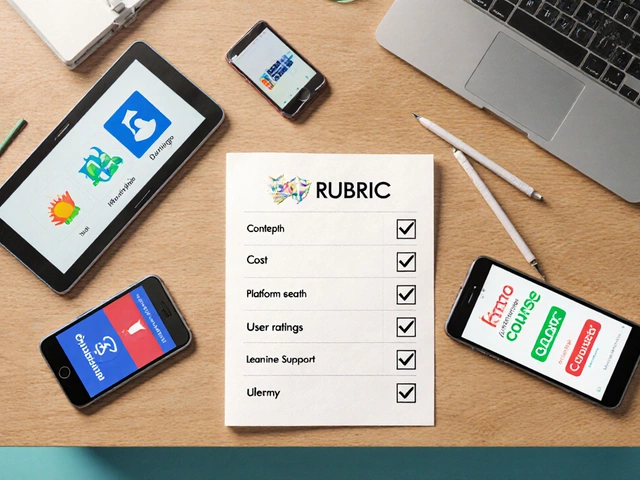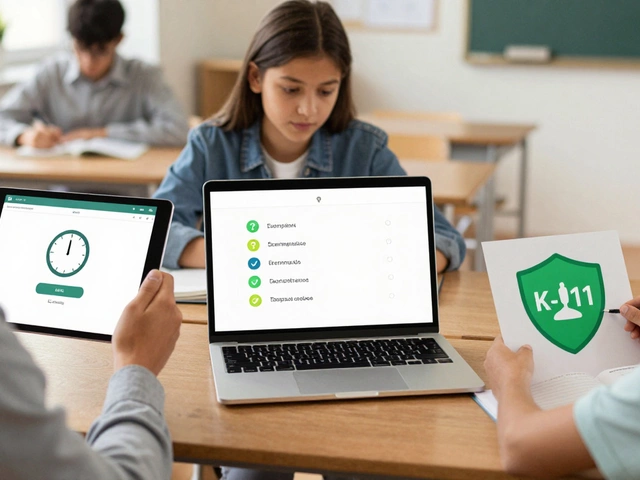Dec
21

- by Dhruv Ainsley
- 0 Comments
Competition runs deep in our veins, driving us to improve and excel in various areas of life, especially in the realm of academics. In the context of competitive exams, this trait can be both a boon and a challenge. It's not just about outperforming others; it's about challenging oneself to reach greater heights.
As we dive into the world of competitive exams, we'll explore how our natural urge to compete can motivate us and what it truly signifies in the academic arena. More than just taking tests, it’s about strategic study, mental resilience, and understanding how to balance personal goals with the collaborative spirit of learning. Join us as we unravel the complexities of competition in education and learn how to channel that energy into building a path to academic success.
- The Nature of Competitiveness
- Psychological Impacts of Being Competitive
- Tips for Effective Exam Preparation
- Balancing Competition with Collaboration
- Harnessing Competitiveness for Success
The Nature of Competitiveness
Competitiveness is a fascinating trait, deeply embedded in the fabric of human behavior. It's a force that propels individuals to strive towards goals with passion and resolve. In the context of competitive exams, it often encompasses a blend of motivation, fear of failure, and the sheer desire to stand out. This mix creates a dynamic landscape where students push their boundaries to not only meet but exceed expectations. The roots of competitiveness can often be traced back to the early stages of education, where children are subtly encouraged to outperform their peers. This conditioning continues into adulthood, shaping how we approach challenges like exams.
Interestingly, competitiveness is not just about beating others; it's also about self-improvement. Many students find themselves competing against their past performances, constantly raising the bar for personal success. This internal drive can foster a sense of discipline and resilience, crucial for navigating the demanding preparatory phases of exams. According to educational psychologist Dr. Linda Gottfredson, "The competitive spirit can be nurtured as a positive force when it fuels growth and learning rather than anxiety and denial." Her insights remind us that the context and perception of competitiveness can shape its outcomes.
The psychological components of competitiveness involve both intrinsic and extrinsic motivators. Intrinsic motivators are those personal goals and desires to master a subject or skill. In contrast, extrinsic motivators might include accolades, recognition, or rewards, fueling a different kind of drive. Understanding these motivators can help students tailor their study habits effectively. Balancing these elements is key to maintaining a healthy competitive edge. For instance, intrinsic motivation often leads to more sustainable satisfaction because it's grounded in personal fulfillment rather than external validation.
An important aspect of understanding competitiveness is recognizing its impact on mental health. It's crucial to differentiate between healthy and unhealthy levels of competition. While striving to excel can be invigorating, excessive pressure can lead to stress and burnout. This is particularly true in academic settings where the stakes of exams seem ever-high. Schools and educators can play a pivotal role in this regard by promoting a balanced environment, where collaboration is as valued as competition. Peer learning and group studies can often diffuse competitive tension, allowing students to broaden their perspectives and learn more cooperatively.
Moreover, different cultures perceive competitiveness in unique ways. In some societies, academic prowess and success in exams are seen as a gateway to future prosperity, making them a litmus test for future achievements. In others, the emphasis may be on holistic development where competitiveness coexists with creativity and empathy. Reflecting on these cultural nuances provides a richer understanding of how competitiveness shapes education globally. Such insights can be valuable for students who participate in international exams, helping them adapt their strategies accordingly.
According to a survey by the Educational Testing Service, about 68% of students believe that competition drives them to perform better, highlighting the positive potential of competitive environments when managed correctly.
Ultimately, competitiveness is a multifaceted trait that, when harnessed appropriately, can be a powerful ally in achieving academic success. Recognizing the subtleties of your competitive nature can open pathways to smarter study practices and healthier performance methods. As you navigate the waters of competitive exams, remember that the journey of competition is not just about the endpoints but also about the transformative experiences along the way.
Psychological Impacts of Being Competitive
There's an intriguing depth to the human mind, especially when it comes to the motivation that drives us to compete. The psychological impacts of being competitive are layered and can manifest in varied aspects of our lives. Being competitive can spark a tremendous amount of discipline and determination. This mindset is especially crucial in competitive exams, where the stakes are often high, and the challenges demanding. Individuals with a competitive nature may experience a constant push to outdo themselves and others, which can translate to higher personal achievement and fulfillment.
Yet, a competitive spirit can also bring about stress if not managed properly. The pressure to perform can lead to anxiety, a common phenomenon among students preparing for exams. The fear of underperforming may stem not only from personal expectations but also from societal pressures and the weight of comparison with peers. This might cause students to equate their self-worth with their academic success, affecting their mental health in the long run. Understanding this balance is essential to ensure that competition doesn't become an unhealthy obsession.
Specialists have found that a positive outcome of a competitive nature is enhanced motivation. It's not unusual for individuals with a robust competitive streak to push themselves further, leading to a greater drive for learning and self-improvement. This drive can be harnessed as a potent tool for growth in fields influenced heavily by exam preparation. However, maintaining this motivation without tipping into burnout is a delicate equilibrium. Research has shown that healthy competition can foster resilience, an invaluable trait for lifelong success.
"Competition can be the spur that motivates us, but once that push morphs into a quest for superiority, it often leads to stress, as noted by psychologists studying performance dynamics."
While being competitive can boost one's mental acuity, it also requires handling defeat gracefully. Not every competitive venture will result in victory, and developing a mindset to learn from failures rather than being discouraged is critical. Emphasizing effort and improvement over flawless outcomes can help mitigate the adverse impacts that often accompany a competitive mindset. This approach nurtures a growth mindset, allowing individuals to see challenges as opportunities rather than setbacks.
Lastly, the social dimension of competitiveness shouldn’t be overlooked. A highly competitive individual might inadvertently distance themselves from peers if they prioritize winning over relationships. Striving to engage in cooperative learning environments can balance this out. These settings encourage collaboration and mutual support, reinforcing that competition isn't always about beating others. It's just as much about personal growth and achieving one's best potential. Blending competition with collaboration often yields richer educational experiences, preparing individuals more holistically for the diverse challenges of the real world.

Tips for Effective Exam Preparation
Preparing for competitive exams can be a daunting task, requiring not just hard work, but a strategic approach that maximizes your potential and understanding of the material. The first step in effective preparation is to familiarize yourself with the syllabus and the exam pattern. Breaking down the syllabus into manageable segments allows you to focus on one portion at a time without feeling overwhelmed. Schedule your study sessions at times when your focus and energy levels are highest to ensure that each study session is productive. Implement the Pomodoro Technique, which involves 25-minute study sessions followed by a 5-minute break, to maintain concentration and allow your brain time to rest and absorb information.
Next, engage with quality resources that offer both depth and clarity. Select textbooks and guides that align with the exam preparation needs and accommodate varied learning styles. Practice with past papers and timed mock tests regularly; this builds familiarity with the exam format and helps develop time management skills under pressure. Doing so not only reinforces the material but identifies areas where you might need extra review. It’s advisable to form a study group if possible. Learning with peers opens up opportunities for discussions and explanations that can enhance understanding and retention. However, ensure these sessions remain focused and don't become social meet-ups instead.
An often overlooked but vital aspect of exam preparation is maintaining a healthy lifestyle. Proper nutrition, adequate sleep, and regular physical activity are crucial as they directly impact cognitive function and mood. Eating brain-boosting foods like nuts, fish, blueberries, and dark chocolate can enhance concentration and memory. Don't underestimate the power of a good night's sleep, aiming for 7-9 hours daily, as it consolidates memories and information you’ve learned throughout the day. Physical activity, whether it’s a brisk walk or a brief workout, gets your blood flowing and enhances overall well-being, reducing stress and improving mood.
"Effective learning often stems not from the questions we ask, but rather how we engage with and apply the answers." – Albert Einstein
Utilize technology wisely. Numerous apps and online platforms provide tools for flashcards, quizzes, and interactive learning. Such resources make learning engaging and allow you to track your progress over time. Remember to dig into online forums and online study groups where experiences and insights are shared freely. However, beware of the distractions that come with technology and prioritize your study time over social media scrolling or unrelated internet browsing.
Lastly, don't hesitate to seek help if you're struggling with a certain subject or topic. Teachers, mentors, and tutors can offer valuable insights and explanations that may clarify complex topics. Sometimes, different perspectives can make all the difference in understanding difficult concepts. Remember that asking questions is a crucial part of rich learning and a stepping stone towards success in study tips. Approaching studies with curiosity and determination can turn this challenging environment into an exciting journey of growth.
Balancing Competition with Collaboration
In the fierce environment of competitive exams, the instinct to outshine others often takes center stage. However, another essential ingredient of success is collaboration. While competition pushes individuals to accomplish personal bests, collaboration fosters a sense of community and shared learning. This dual approach can transform how we perceive and tackle academic challenges. Understanding this balance can lead to profound benefits both in personal development and academic achievement. The process involves recognizing that knowledge can be exponentially increased and enriched when we share ideas and learn collectively. It's about understanding how teamwork doesn’t hinder personal success but can enhance it through diverse perspectives and shared problem-solving experiences.
Working alongside others often unlocks access to a broader range of resources. For instance, study groups are a practical way where students engage collectively to solve complex problems, sometimes making sense of tough concepts through discussions, which they might struggle to understand individually. In a setting where students motivate and learn from each other, everyone benefits. This doesn’t mean competition is sidelined; rather, it's complemented. Imagine preparing for an exam where each group member handles a portion of the syllabus and then teaches it to the others. Such exercises ensure a more profound understanding, promoting both specialization and comprehensive learning through responsibility sharing.
Universities and colleges themselves recognize the value of collaboration in competitive scenarios. In competitive exams, you might find that collaborating on projects or participating in study groups is not just encouraged but often integrated into assessment criteria. Institutions often design their curriculum to balance both elements—honing personal achievements while also cultivating the ability to work effectively with others. “The most effective way to achieve top performance is not by trying to compete with others but by working together,” says Daniel Goleman, a celebrated author on emotional intelligence.
The synergy between collaboration and competition creates an environment where individual brilliance and group harmony coexist, driving greater accomplishments.Such philosophies remind us that life, much like academics, benefits immensely when efforts are pooled towards common goals.
However, the challenge lies in ensuring competition doesn’t translate into unhealthy rivalry. Safeguarding against this involves creating a culture where successes are celebrated as part of the collective achievement. Schools encourage this by actively promoting interdependence and teaching students the art of giving and receiving feedback constructively. This involves developing a mindset that sees growth as a communal journey rather than a solo race. In the realm of academics, especially exam preparation, it's this harmony between striving for personal excellence and contributing to collective goals that marks the path to genuine learning and fulfillment.

Harnessing Competitiveness for Success
The drive to excel, especially in the arena of competitive exams, can be a powerful force that steers individuals toward remarkable achievements. But to truly harness this competitive spirit for success, it is important to understand how to channel it effectively. Many view competitiveness as merely a desire to outperform peers, but at its core, it is about striving for personal excellence and setting high standards for oneself. This mindset can be particularly beneficial in an academic environment where such pressures often manifest.
To start, it's essential for students to set clear, achievable goals. Instead of measuring success solely by outperforming others, it's more productive to focus on personal milestones and improvements. This approach fosters a healthier attitude towards competition. For instance, by breaking down preparation into smaller, manageable tasks, students can track their progress and build confidence over time. A study conducted by the Education Endowment Foundation found that students who set personal goals showed improved performance compared to those who didn't have a clear focus.
"Successful competitors know that their greatest competition is with themselves," said Angela Duckworth, an American academic and psychologist known for her research on grit and self-control.
Building a solid study routine is another step towards turning competitiveness into a tool for success. A well-structured plan helps maintain discipline and provides a sense of accomplishment with each completed task. Consistency in following this routine can lead to significant progress over time. Besides, incorporating varied learning techniques—such as using flashcards, engaging in group studies, or leveraging online resources—can keep the learning process dynamic and less monotonous, which is crucial for sustaining motivation.
Moreover, it's vital to cultivate resilience and adaptability. Not every exam will go as planned, and setbacks are a natural part of the learning journey. Resilient students view mistakes as learning opportunities rather than failures. By embracing a growth mindset, as popularized by psychologist Carol Dweck, students can maintain their drive in the face of challenges. This adaptability is crucial in competitive settings where conditions and expectations constantly evolve.
Finally, balancing competition with collaboration can lead to unexpected advantages. While individual achievement is important, study groups and peer collaborations offer a platform for exchanging diverse ideas and approaches. These interactions not only enrich learning experiences but also forge connections that can be valuable beyond academics. Encouraging a sense of community rather than rivalry fosters an environment where everyone's strengths are recognized, ultimately leading to collective success.





